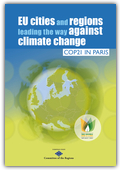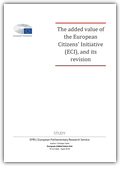Spotlight on the future of EU energy and climate policy
Climate change, and in particular the rise in global temperatures caused by human activity, has long been a primary issue in the EU and international political agendas, since it represents one of the most serious threats to the well-being of humankind. The EU has established itself as a leading force in the field due to its proactive role in the international climate debate, along with its dynamic internal climate policy. The latter is strongly related to its energy policy, the objectives of which, besides environmental protection, are to secure supplies, increase energy efficiency and expand the internal energy market.
Did you know that the EU Member States have agreed a target of at least a 40 % reduction in greenhouse gas emissions by 2030, or that members of the European Parliament have called upon the European Commission to prepare a mid-century zero-emissions strategy? Find out more interesting facts in the following publications on the topic.
|
| |
 |
| PDF/PAPER |
 |
 |
In this factsheet you can read in brief what the EU does to cut greenhouse emissions and address the unavoidable consequences of climate change. EU action on climate change seeks to tackle changes to the Earth’s climate, in particular the rise in global temperatures. Higher temperatures have many consequences, such as flooding or droughts in areas previously immune to such threats and extreme weather events that jeopardise food production, especially in poorer countries.
Available in all the official languages of the EU |
| |
 |
| PDF/PAPER |
 |
 |
This factsheet describes what the main problems in the European energy landscape are and what the EU is doing to address them. Our way of life is such that energy is vital for essential day-to-day services. Without it, neither we nor our businesses can function. However, making sure we have all the energy we need, at a price we can afford, both now and in the future, is not easy.
Available in all the official languages of the EU |
 |
| PDF/PAPER |
 |
 |
Clean, smart and renewable
Signals, an annual publication of the European Environment Agency, looks into Europe’s transition towards clean, smart and renewable energy. We have reached a point in time at which we have a critical decision to make: we have the negative impacts of our current energy choices on the one hand, and the opportunities that energy sources offer on the other.
Available in Bulgarian, English, French, German, Polish, Slovenian, Turkish |
More on this topic |
| |
 |
| PDF/HTML/PAPER |
 |
 |
Landscape review
In this publication you will find the perspective and evaluation of the European Court of Auditors on a plethora of factors affecting the environment, such as buildings, industry, transport and agriculture. Climate change and its causes are no longer subject to serious scientific dispute. According to the Intergovernmental Panel on Climate Change, human influence on the climate system is clear, and is evident from the increasing greenhouse gas concentrations in the atmosphere and the warming observed.
Available in all the official languages of the EU except Irish |
| |
 |
| PDF/PAPER |
 |
 |
'Clean energy for all Europeans' package
The European Economic and Social Committee has made considerable efforts to provide a response to the ‘Clean energy for all Europeans’ package, the large and rich body of work that the European Commission has presented.
This response is provided in this publication in the form of 10 opinions, which together constitute the Committee’s ‘Spring energy’ package.
This contribution is being made for, with and by EU citizens, in consultation not only with representatives of the Commission, but also with MEPs and various stakeholders (businesses, trade unions, consumer groups, environmentalists, etc.).
Available in English and French |
 |
| PDF/PAPER |
 |
 |
COP21 in Paris
The EU’s local and regional governments are contributing to tackling climate change through concerted action and initiatives. The European Committee of the Regions supports this process and represents the local and regional levels in debates within the European Union. This publication presents interesting regional initiatives across the EU.
Available in English |
Research |
 |
| PDF/PAPER |
 |
 |
Innovative ways of treating challenging conditions
Conditions often associated with later life, such as cancer, cardiovascular diseases, Alzheimer’s and Parkinson’s, along with diabetes, are debilitating to the sufferer and a challenge to EU healthcare systems. Therefore, the potential breakthroughs nanomedicine can offer are being carefully and enthusiastically researched through a variety of EU-funded projects, some of the most promising of which are highlighted in this CORDIS results pack.
Available in English |
 |
| PDF/PAPER |
 |
 |
Europe’s push to the final frontier
The European Space Agency continues to envision a potential international human mission to Mars by 2025, whether it uses the Moon as a take-off station or is planned to take off directly from Earth. Until then, multiple robotic missions will be required to make sure that we know as much as possible about Mars and how to get there safely. Various EU-funded projects are working hard to get us there. In this 73rd edition of the research*eu results magazine, we shed light on efforts preparing the ground for the Exomars mission and several other very interesting related topics.
Available in English |
Also out recently |
 |
| PDF/PAPER |
 |
 |
2018 edition
This handbook is designed to familiarise legal practitioners who do not specialise in data protection with this emerging area of the law. It provides an overview of the EU’s and the Council of Europe’s applicable legal frameworks. It also explains key case-law, summarising major rulings of both the Court of Justice of the European Union and the European Court of Human Rights. In addition, it presents hypothetical scenarios that serve as practical illustrations of the diverse issues encountered in this ever-evolving field.
Available in English |
 |
| PDF |
 |
Study
The European citizens’ initiative (ECI) is aimed at bringing the EU closer to its citizens by enabling them to invite the European Commission to make a proposal for a legal act. Introduced by the Treaty of Lisbon, the ECI should provide every citizen with the right to participate in the democratic life of the EU. However, the ECI in practice has faced various procedural hurdles, preventing the fulfilment of the regulation’s objectives. The present study outlines the weaknesses in the existing ECI procedure. Moreover, it assesses, with a view to their added value, the main reform proposals that have been put forward to improve the functioning of the ECI.
Available in English |
 |
| PDF/PAPER |
 |
 |
This booklet contains 52 suggestions on how to support urban biodiversity throughout the year. It includes practical things you can do every day, activities to start or join in your community, how you can help research by watching and recording wildlife and how to use sustainable techniques in your garden.
Available in all the official languages of the EU |
You may also like |
 |
| PDF |
 |
European elections: one year to go
With 1 year to go to the European Parliament elections in May 2019, the latest Parliament Eurobarometer survey confirms citizens’ steadily growing support for and favourability towards the European Union. Over two thirds of respondents are convinced that their country has benefited from being a member of the EU. This is the highest score that has been measured since 1983. Moreover, for the first time a majority of citizens think their voice counts in the EU. Almost a third of respondents already today know the date of the Parliament elections in 2019. Trend results show that this positive development started in the second half of 2016, which may be related to the ‘wake-up call’ experienced after the Brexit referendum in the United Kingdom.
Available in English |
 |
| PDF/PAPER |
 |
 |
EUPL: winners write Europe
In 2018 the European Union Prize for Literature is celebrating its 10th anniversary. To mark this special occasion the EUPL writing contest ‘A European story: EUPL winners write Europe’ was organised. Thirty-six EUPL-winning authors from a total of 26 different countries submitted fascinating European stories, which are compiled in this publication along with translations into English.
Each story in the original language along with English translation |
 |
| PDF/PAPER |
 |
 |
Trends and developments
The Trends and developments report presents a top-level overview of the drug phenomenon in Europe, covering drug supply, use and public health problems, along with drug policy and responses. Together with the online Statistical bulletin and 30 country drug reports, it makes up the 2018 European drug report package. This report is based on information provided to the European Monitoring Centre for Drugs and Drug Addiction by the EU Member States, the candidate country Norway and Turkey in an annual reporting process. The purpose of the current report is to provide an overview and summary of the European drug situation and responses to it.
Available in all the official languages of the EU except Irish and Maltese. Also in Norwegian and Turkish. |
Our news: Datathon 2018 competition — the deadline to register your team is right around the corner
|
|
Can you reuse open data to promote innovative services? Can you solve other societal challenges using it? Can you create mobile or web apps using open data from different information sources? If so, the #EUdatathon2018, organised by the Publications Office is for you! Register your team and make an app proposal by 15 July. If your idea is shortlisted you’ll have 7 weeks, until 23 September, to develop your app. Winners will be selected on 2 October during the final conference of the event in Brussels. All teams invited to the final phase will win prizes, with the winning team in each challenge winning EUR 5 000.
To participate, learn more or follow the event, please visit: https://publications.europa.eu/eudatathon
|

|
 |
|
|